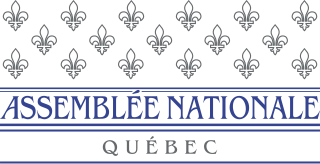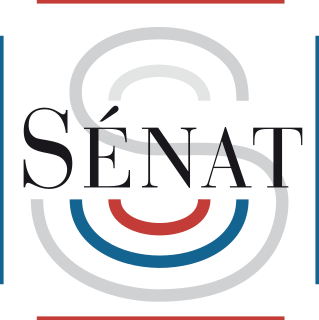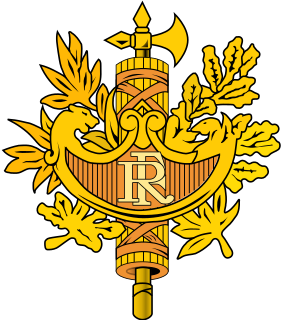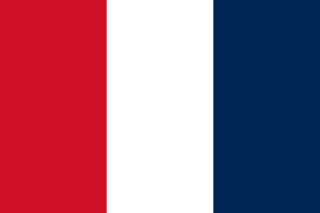Related Research Articles

The International Astronomical Union exists to promote and safeguard the science of astronomy through international cooperation, assign official names and designations to celestial bodies, and liaise with organizations that include amateur astronomers. Founded in 1919 and based in Paris, the IAU is a member of the International Science Council (ISC).

The president of France, officially the president of the French Republic, is the head of state and head of executive of France as well as the commander-in-chief of the French Armed Forces. The French presidency is the supreme magistracy of the country, and the president is the holder of the highest office in France.
In politics, a national assembly is either a unicameral legislature, the lower house of a bicameral legislature, or both houses of a bicameral legislature together. In the English language it generally means "an assembly composed of the representatives of the nation." The population base represented by this name is manifestly the nation as a whole, as opposed to a geographically select population, such as that represented by a provincial assembly. The powers of a National Assembly vary according to the type of government. It may possess all the powers of government, generally governing by committee, or it may function solely within the legislative branch of the government.

On 20 June 1789, the members of the French Third Estate took the Tennis Court Oath, voting "not to separate and to reassemble wherever necessary, until the Constitution of the kingdom is established". It was a pivotal event in the French Revolution. The Estates-General had been called to address the country's fiscal and agricultural crisis, but they had become bogged down in issues of representation immediately after convening in May 1789, particularly whether they would vote by order or by head.

The National Constituent Assembly was formed from the National Assembly on 9 July 1789 during the first stages of the French Revolution. It dissolved on 30 September 1791 and was succeeded by the Legislative Assembly.

The prime minister of the French Republic, sometimes shortened to premier, is the head of government of France. During the Third and Fourth Republics, the head of government was formally called president of the Council of Ministers, generally shortened to president of the Council. However, the post was usually called "prime minister" or "premier" in non-French sources. The prime minister is the holder of the second highest office of France.

The National Assembly is the lower house of the bicameral French Parliament under the Fifth Republic, the upper house being the Senate. The National Assembly's legislators are known as députés.

The French Fourth Republic was the republican government of France from 27 October 1946 to 4 October 1958, governed by the fourth republican constitution. It was in many ways a revival of the Third Republic that was in place from 1870 during the Franco-Prussian War to 1940 during World War II, and suffered many of the same problems. France adopted the constitution of the Fourth Republic on 13 October 1946.

The Premier of Quebec is the head of government of the Canadian province of Quebec. The current Premier of Quebec is François Legault of the Coalition Avenir Québec, sworn in on October 18, 2018 following the 2018 election.

The National Assembly of Quebec is the legislative body of the province of Quebec in Canada. Legislators are called MNAs. The Queen in Right of Quebec, represented by the Lieutenant Governor of Quebec and the National Assembly compose the Legislature of Quebec, which operates in a fashion similar to those of other Westminster-style parliamentary systems. The assembly has 125 members elected first past the post from single-member districts.
A Member of Provincial Parliament (MPP) is an elected member of the Legislative Assembly of the Canadian province of Ontario. Elsewhere in Canada, the titular designation "Member of Provincial Parliament" has also been used to refer to members of the Legislative Assembly of Lower Canada from 1791 to 1838, and to members of the Legislative Assembly of Quebec from 1955 to 1968.

The Senate is the upper house of the French Parliament, which, along with the National Assembly—the lower chamber—constitutes the legislature of France. It is made up of 348 Senators elected by part of the country's local councillors, as well as by representatives of French citizens living abroad. Senators have six-year terms, with half of the seats up for election every three years.

{{distinguish|text=the National Assembly of France, the lower house of the Parliament of the French

The French Parliament is the bicameral legislature of the French Republic, consisting of the Senate and the National Assembly. Each assembly conducts legislative sessions at separate locations in Paris: the Senate meets in the Palais du Luxembourg and the National Assembly convenes at Palais Bourbon.

The prime minister of Cambodia is the head of government of Cambodia. The prime minister is also the chairman of the Cabinet and leads the executive branch of the Royal Cambodian Government. The prime minister is a member of parliament, and is appointed by the monarch for a term of five years. Since 1945, 36 individuals have served as prime minister; 32 as official prime ministers, and 4 in acting capacities.

The Kingdom of France was a constitutional monarchy that governed France from 3 September 1791 until 21 September 1792, when this constitutional monarchy was succeeded by the First Republic.
The 1st constituency of French Polynesia is a French legislative constituency in French Polynesia.

The politics of France take place with the framework of a semi-presidential system determined by the French Constitution of the French Fifth Republic. The nation declares itself to be an "indivisible, secular, democratic, and social Republic". The constitution provides for a separation of powers and proclaims France's "attachment to the Rights of Man and the principles of national sovereignty as defined by the Declaration of 1789."

The 6th constituency of Moselle is one of the nine legislative constituencies in the Moselle département (Lorraine).